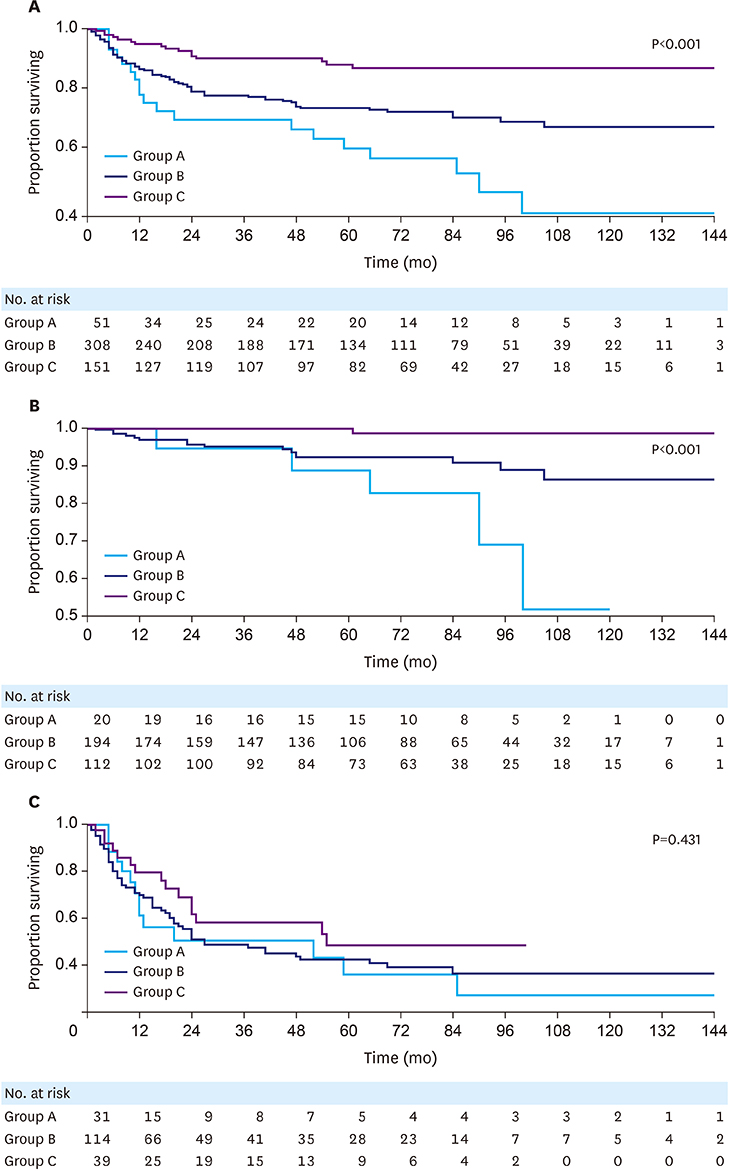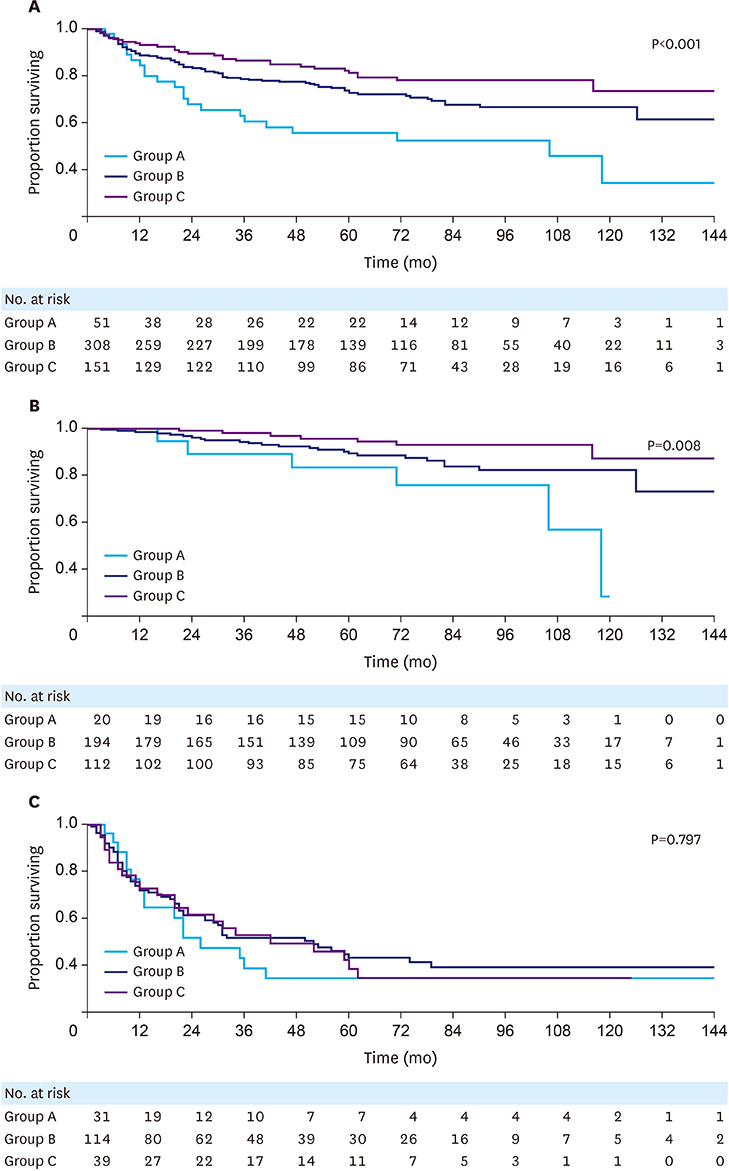J Gastric Cancer.
2018 Sep;18(3):274-286. 10.5230/jgc.2018.18.e30.
The Impact of Preoperative Low Body Mass Index on Postoperative Complications and Long-term Survival Outcomes in Gastric Cancer Patients
- Affiliations
-
- 1Department of Surgery, Incheon St. Mary's Hospital, College of Medicine, The Catholic University of Korea, Incheon, Korea. kjj@catholic.ac.kr
- KMID: 2420787
- DOI: http://doi.org/10.5230/jgc.2018.18.e30
Abstract
- PURPOSE
The aim of this study was to investigate the impact of preoperative low body mass index (BMI) on both the short- and long-term outcomes in patients with gastric cancer.
MATERIALS AND METHODS
A total of 510 patients with gastric cancer were divided into the following 3 groups: low BMI group (≤18.5 kg/m2, n=51), normal BMI group (18.6-24.9 kg/m2, n=308), and high BMI group (≥25.0 kg/m2, n=151).
RESULTS
There were significantly more stage III/IV patients in the low BMI group than in the other groups (P=0.001). Severe postoperative complications were more frequent (P=0.010) and the survival was worse (P < 0.001) in the low BMI group. The subgroup analysis indicated that survival was worse in the low BMI group of the stage I/II subgroup (P=0.008). The severe postoperative complication rate was higher in the low BMI group of the stage III/IV subgroup (P=0.001), although the recurrence rate and survival did not differ in the stage III/IV subgroup among all the BMI groups. Low BMI was an independent poor prognostic factor in the stage I/II subgroup (disease-free survival: hazard ratio [HR], 13.521; 95% confidence interval [CI], 1.186-154.197; P=0.036 and overall survival: HR, 5.130; 95% CI, 1.644-16.010; P=0.005), whereas low BMI was an independent risk factor for severe postoperative complications in the stage III/IV subgroup (HR, 17.158; 95% CI, 1.383-212.940; P=0.027).
CONCLUSIONS
Preoperative low BMI in patients with gastric cancer adversely affects survival among those with stage I/II disease and increases the severe postoperative complication rate among those with stage III/IV disease.
Keyword
MeSH Terms
Figure
Cited by 2 articles
-
Biomarkers for Evaluating the Inflammation Status in Patients with Cancer
Ali Guner, Hyoung-Il Kim
J Gastric Cancer. 2019;19(3):254-277. doi: 10.5230/jgc.2019.19.e29.Risk factors for cancer-specific survival in elderly gastric cancer patients after curative gastrectomy
Xiao Liu, Zhigang Xue, Jianchun Yu, Zhiqiang Ma, Weiming Kang, Xin Ye, Zijian Li
Nutr Res Pract. 2022;16(5):604-615. doi: 10.4162/nrp.2022.16.5.604.
Reference
-
1. Crew KD, Neugut AI. Epidemiology of gastric cancer. World J Gastroenterol. 2006; 12:354–362.
Article2. An JY, Cheong JH, Hyung WJ, Noh SH. Recent evolution of surgical treatment for gastric cancer in Korea. J Gastric Cancer. 2011; 11:1–6.
Article3. Jung KW, Won YJ, Kong HJ, Oh CM, Cho H, Lee DH, et al. Cancer statistics in Korea: incidence, mortality, survival, and prevalence in 2012. Cancer Res Treat. 2015; 47:127–141.
Article4. Kim JP. Current status of surgical treatment of gastric cancer. J Surg Oncol. 2002; 79:79–80.
Article5. Jeong O, Park YK. Clinicopathological features and surgical treatment of gastric cancer in South Korea: the results of 2009 nationwide survey on surgically treated gastric cancer patients. J Gastric Cancer. 2011; 11:69–77.
Article6. Nashimoto A, Akazawa K, Isobe Y, Miyashiro I, Katai H, Kodera Y, et al. Gastric cancer treated in 2002 in Japan: 2009 annual report of the JGCA nationwide registry. Gastric Cancer. 2013; 16:1–27.
Article7. van de Velde CJ. Randomized clinical trial comparing survival after D1 or D2 gastrectomy for gastric cancer (Br J Surg 2014; 101: 23–31). Br J Surg. 2014; 101:31–32.8. Lin YS, Huang KH, Lan YT, Fang WL, Chen JH, Lo SS, et al. Impact of body mass index on postoperative outcome of advanced gastric cancer after curative surgery. J Gastrointest Surg. 2013; 17:1382–1391.
Article9. Liu BZ, Tao L, Chen YZ, Li XZ, Dong YL, Ma YJ, et al. Preoperative body mass index, blood albumin and triglycerides predict survival for patients with gastric cancer. PLoS One. 2016; 11:e0157401.
Article10. Ejaz A, Spolverato G, Kim Y, Poultsides GA, Fields RC, Bloomston M, et al. Impact of body mass index on perioperative outcomes and survival after resection for gastric cancer. J Surg Res. 2015; 195:74–82.
Article11. Hsu JT, Wang CC, Le PH, Chen TH, Kuo CJ, Lin CJ, et al. Lymphocyte-to-monocyte ratios predict gastric cancer surgical outcomes. J Surg Res. 2016; 202:284–290.
Article12. Kanda M, Mizuno A, Tanaka C, Kobayashi D, Fujiwara M, Iwata N, et al. Nutritional predictors for postoperative short-term and long-term outcomes of patients with gastric cancer. Medicine (Baltimore). 2016; 95:e3781.
Article13. Nishijima TF, Muss HB, Shachar SS, Tamura K, Takamatsu Y. Prognostic value of lymphocyte-to-monocyte ratio in patients with solid tumors: a systematic review and meta-analysis. Cancer Treat Rev. 2015; 41:971–978.
Article14. Santoso JT, Barton G, Riedley-Malone S, Wan JY. Obesity and perioperative outcomes in endometrial cancer surgery. Arch Gynecol Obstet. 2012; 285:1139–1144.
Article15. Makino T, Shukla PJ, Rubino F, Milsom JW. The impact of obesity on perioperative outcomes after laparoscopic colorectal resection. Ann Surg. 2012; 255:228–236.
Article16. Balentine CJ, Wilks J, Robinson C, Marshall C, Anaya D, Albo D, et al. Obesity increases wound complications in rectal cancer surgery. J Surg Res. 2010; 163:35–39.
Article17. Backes FJ, Nagel CI, Bussewitz E, Donner J, Hade E, Salani R. The impact of body weight on ovarian cancer outcomes. Int J Gynecol Cancer. 2011; 21:1601–1605.
Article18. Tsai S, Choti MA, Assumpcao L, Cameron JL, Gleisner AL, Herman JM, et al. Impact of obesity on perioperative outcomes and survival following pancreaticoduodenectomy for pancreatic cancer: a large single-institution study. J Gastrointest Surg. 2010; 14:1143–1150.
Article19. Nobuoka D, Gotohda N, Kato Y, Takahashi S, Konishi M, Kinoshita T. Influence of excess body weight on the surgical outcomes of total gastrectomy. Surg Today. 2011; 41:928–934.
Article20. Kodera Y, Ito S, Yamamura Y, Mochizuki Y, Fujiwara M, Hibi K, et al. Obesity and outcome of distal gastrectomy with D2 lymphadenectomy for carcinoma. Hepatogastroenterology. 2004; 51:1225–1228.21. Inagawa S, Adachi S, Oda T, Kawamoto T, Koike N, Fukao K. Effect of fat volume on postoperative complications and survival rate after D2 dissection for gastric cancer. Gastric Cancer. 2000; 3:141–144.
Article22. Kim MG, Yook JH, Kim KC, Kim TH, Kim HS, Kim BS, et al. Influence of obesity on early surgical outcomes of laparoscopic-assisted gastrectomy in gastric cancer. Surg Laparosc Endosc Percutan Tech. 2011; 21:151–154.
Article23. Chen S, Nie RC, OuYang LY, Li YF, Xiang J, Zhou ZW, et al. Body mass index (BMI) may be a prognostic factor for gastric cancer with peritoneal dissemination. World J Surg Oncol. 2017; 15:52.
Article24. Lee HH, Park JM, Song KY, Choi MG, Park CH. Survival impact of postoperative body mass index in gastric cancer patients undergoing gastrectomy. Eur J Cancer. 2016; 52:129–137.
Article25. Balakrishnan VS. Low BMI linked to worse colorectal cancer outcomes. Lancet Oncol. 2015; 16:e593.
Article26. Renfro LA, Loupakis F, Adams RA, Seymour MT, Heinemann V, Schmoll HJ, et al. Body mass index is prognostic in metastatic colorectal cancer: pooled analysis of patients from first-line clinical trials in the ARCAD database. J Clin Oncol. 2016; 34:144–150.
Article27. Shibakita M, Yoshimura H, Tachibana M, Ueda S, Nagasue N. Body mass index influences long-term outcome in patients with colorectal cancer. Hepatogastroenterology. 2010; 57:62–69.28. Nakagawa T, Toyazaki T, Chiba N, Ueda Y, Gotoh M. Prognostic value of body mass index and change in body weight in postoperative outcomes of lung cancer surgery. Interact Cardiovasc Thorac Surg. 2016; 23:560–566.
Article29. Li Q, Xing H, Liu D, Li H. Negative impact of low body mass index on liver cirrhosis patients with hepatocellular carcinoma. World J Surg Oncol. 2015; 13:294.
Article30. Li ZQ, Zou L, Liu TR, Yang AK. Prognostic value of body mass index before treatment for laryngeal squamous cell carcinoma. Cancer Biol Med. 2015; 12:394–400.31. Washington K. 7th edition of the AJCC cancer staging manual: stomach. Ann Surg Oncol. 2010; 17:3077–3079.
Article32. Sano T, Aiko T. New Japanese classifications and treatment guidelines for gastric cancer: revision concepts and major revised points. Gastric Cancer. 2011; 14:97–100.
Article33. WHO Expert Consultation. Appropriate body-mass index for Asian populations and its implications for policy and intervention strategies. Lancet. 2004; 363:157–163.34. Dindo D, Demartines N, Clavien PA. Classification of surgical complications: a new proposal with evaluation in a cohort of 6336 patients and results of a survey. Ann Surg. 2004; 240:205–213.35. Wada T, Kunisaki C, Ono HA, Makino H, Akiyama H, Endo I. Implications of BMI for the prognosis of gastric cancer among the Japanese population. Dig Surg. 2015; 32:480–486.
Article36. Migita K, Takayama T, Matsumoto S, Wakatsuki K, Tanaka T, Ito M, et al. Impact of being underweight on the long-term outcomes of patients with gastric cancer. Gastric Cancer. 2016; 19:735–743.
Article37. Lien YC, Hsieh CC, Wu YC, Hsu HS, Hsu WH, Wang LS, et al. Preoperative serum albumin level is a prognostic indicator for adenocarcinoma of the gastric cardia. J Gastrointest Surg. 2004; 8:1041–1048.
Article38. Sun K, Chen S, Xu J, Li G, He Y. The prognostic significance of the prognostic nutritional index in cancer: a systematic review and meta-analysis. J Cancer Res Clin Oncol. 2014; 140:1537–1549.
Article39. Lieberman MD, Reynolds J, Goldfine J, Shou J, Daly JM. Protein-calorie malnutrition inhibits antitumor response to interleukin-2 immunotherapy. Surgery. 1990; 108:452–458.40. Ruffmann R, Schlick E, Tartaris T, Budzynski W, Chirigos MA. Protein deficiency reduces natural antitumor immunity. Cancer Detect Prev Suppl. 1987; 1:15–27.41. Norero E, Vega EA, Diaz C, Cavada G, Ceroni M, Martínez C, et al. Improvement in postoperative mortality in elective gastrectomy for gastric cancer: Analysis of predictive factors in 1066 patients from a single centre. Eur J Surg Oncol. 2017; 43:1330–1336.
Article42. Selby LV, Vertosick EA, Sjoberg DD, Schattner MA, Janjigian YY, Brennan MF, et al. Morbidity after total gastrectomy: analysis of 238 patients. J Am Coll Surg. 2015; 220:863–871.e2.43. Papenfuss WA, Kukar M, Oxenberg J, Attwood K, Nurkin S, Malhotra U, et al. Morbidity and mortality associated with gastrectomy for gastric cancer. Ann Surg Oncol. 2014; 21:3008–3014.
Article
- Full Text Links
- Actions
-
Cited
- CITED
-
- Close
- Share
- Similar articles
-
- The Impact of Different Types of Complications on Long-Term Survival After Total Gastrectomy for Gastric Cancer
- Long-Term Changes of Body Mass Index and Nutritional Biochemical Markers in the Obese Elderly with Gastric Cancer
- Low muscle mass-to-fat ratio is an independent factor that predicts worse overall survival and complications in patients with colon cancer: a retrospective single-center cohort study
- The Influence of Lifestyle Behaviors and Body Mass Index Changes on Long-term Outcomes After Gastric Cancer Surgery: A Population-Based Cohort Study
- Long-Term Outcomes of Colon Conduits in Surgery for Primary Esophageal Cancer: A Propensity Score-Matched Comparison to Gastric Conduits



